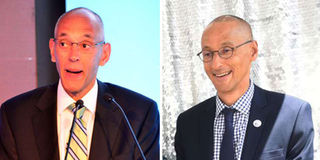Ndegwa brothers reveal Sh3.2 billion NCBA ownership

NCBA Group chairman James Ndegwa (left) and his brother Andrew Ndegwa each own a 4.16 percent personal stake in the bank with a market value of Sh1.6 billion apiece. FILE PHOTOS | NMG
What you need to know:
- NCBA Group chairman James Ndegwa and his brother Andrew Ndegwa each own a 4.16 percent personal stake in the bank with a market value of Sh1.6 billion apiece.
- The brothers held shares in the two banks --NIC Group and CBA Group-- and the merger has consolidated their ownership in NCBA, which is now ranked third in the country by assets.
- The larger Ndegwa family has an estimated 11.6 percent stake in NCBA with a market value of Sh4.6 billion based on the lender’s share price of Sh26.4 on Friday.
NCBA Group chairman James Ndegwa and his brother Andrew Ndegwa each own a 4.16 percent personal stake in the bank with a market value of Sh1.6 billion apiece.
The Nairobi Securities Exchange-listed firm has made the disclosure through its first annual report based on the requirement that directors of publicly-traded firms reveal their ownership.
The two are non-executive directors of NCBA, the product of the merger of the NIC Group and CBA Group in September last year.
The brothers held shares in the two banks and the merger has consolidated their ownership in NCBA, which is now ranked third in the country by assets.
James previously held 52.5 million shares of NIC and 3.1 million shares of CBA. Andrew held 52.5 million shares of NIC and 3.4 million shares of CBA.
The CBA shares were subsequently multiplied 2.7 times and transferred to the merged bank.
The merger was done through a share swap, with former CBA shareholders ending up with a combined 53 percent equity in the merged entity while former NIC investors were allotted a 47 percent stake.
On completion of the transaction, James’ holdings had consolidated into 61.3 million shares equivalent to a 4.09 percent stake in NCBA while Andrew’s stood at 62.2 million shares (4.16 percent).
The larger Ndegwa family has an estimated 11.6 percent stake in NCBA with a market value of Sh4.6 billion based on the lender’s share price of Sh26.4 on Friday.
The brothers are among a group of top investors with banking stakes valued at more than Sh1 billion each. Others include Equity Group’s chief executive James Mwangi who holds a 4.38 percent stake in the lender worth Sh5.4 billion.
Co-operative Bank chief executive Gideon Muriuki has a two percent stake in the lender valued at Sh1.4 billion.
ECONOMIES OF SCALE
It is not clear when the Ndegwa brothers acquired shares in the former CBA but the disclosures ahead of the merger shows that Kenyans became shareholders in the lender after buying out Bank of America between 1984 and 1992.
The Ndegwa family, through their investment vehicle, First Chartered Securities, also acquired their initial 12 percent stake in NIC between 1993 and 1996 by buying shares from the lender’s previous owner, Barclays Bank of Kenya.
The family, one of wealthiest in Kenya, later acquired more shares in NIC to reach a 25 percent stake by the time the lender merged with CBA.
The brothers are the sons of late Philip Ndegwa, a former CBK governor, who died in 1996.
The two lenders merged to benefit from economies of scale in a competitive industry where big banks take most of the profits from diversified operations including retail and corporate banking.
NCBA is now ranked third with assets of Sh509.5 billion in the first quarter ended March, trailing Equity (Sh693.2 billion) and KCB (Sh947 billion).
Co-op Bank, which is now ranked fourth after the rise of NCBA, had Sh470.4 billion in assets. Co-op Bank, however, retains its rank as the third most profitable lender with net earnings of Sh3.5 billion or more than twice NCBA’s Sh1.6 billion in the review period.
“In the next year we will concentrate a lot of our efforts in consolidating our business, ensuring the best of our twin heritage is rolled out smoothly across the region and even internally,” James Ndegwa wrote in the NCBA report.
“We anticipate receiving the remaining regulatory approvals in Uganda and Tanzania to operate as NCBA soon and these will allow us to consolidate our business in the region.”




